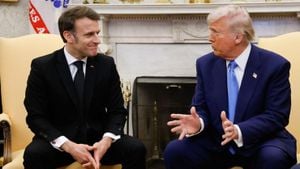Federal workers across the United States are grappling with confusion and anxiety following Elon Musk's controversial request for documentation of their work activities from the previous week, leading to disarray among government agencies.
On Monday, employees within the Department of Health and Human Services (HHS) received communications stating their response to Musk-backed directives to detail their work were not mandatory, after having been initially instructed to reply. This shift in policy left many workers questioning their job security amid fears of repercussions for non-compliance.
"We're trying to find out if people are working and so we're sending a letter to people, please tell us what you did last week," said President Donald Trump, who supported Musk's initiative. "If people don't respond, it's very possible there is no such person or they're not working." The comments, made during a press briefing, contributed to growing confusion as agencies handled the order differently.
Over the weekend, the Office of Personnel Management (OPM) had sent out directives asking federal employees to provide five examples of work performed over the past week. By Monday, hours later, the guidance shifted, stating the responses were voluntary. This left many wondering how best to proceed, with some departments explicitly advising against compliance.
Employees were cautioned to protect sensitive information if they chose to respond. An email from HHS management advised staff to keep responses general and avoid naming colleagues or discussing specific projects, highlighting the potential risk of their communications being read by external threats. Despite the initial request for input, it was emphasized to the federal workforce there would be no punishment for those who opted to remain silent.
Widespread bafflement ensued as agencies, including the Departments of Defense, Justice, and the FBI, which are led by Trump appointees, took divergent stances on how to handle the request. "They're succeeding in driving us insane," lamented one HHS employee, who asked to remain anonymous for fear of retaliation.
Adding to the chaos, Trump later remarked, “If you don’t answer, you’re sort of semi-fired,” supporting Musk's demand for accountability. Musk, as head of the Department of Government Efficiency (Doge), reiterated the ultimatum granting workers another chance to comply, underscoring his expectation for the employees to engage.
"The email request was utterly trivial," Musk defended, remarking the standard was simply to type some words and hit send. “Yet so many failed even this inane test,” he stated through social media, indicating dissatisfaction with employees’ compliance. His directives have sparked anger among labor unions, leading to lawsuits arguing against the imposition of such work documentation mandates.
Despite pushback from various federal departments claiming they will not enforce the directive, the White House emphasized unity. Karoline Leavitt, Press Secretary, claimed, “Everyone is working together as one unified team at the direction of President Trump,” inadvertently igniting concerns over the standards governing federal employment.
Observers across the political spectrum are watching closely as the backlash from both workers and union groups mounts. On one side, Musk’s approach is being praised by MAGA Republicans, celebrating the push for accountability among federal workers; on the other, it has raised alarm bells over privacy concerns and the potential establishment of new norms for government oversight of personnel.
Lawyers representing the aggrieved workers argue this is not merely about documentation, but about the chilling effect on job security and employee rights, as sentiments against authoritarian management styles have begun surfacing.
These recent events cast light on larger questions concerning the role of private-sector leaders like Musk within public service and the accountability of the government to its employees. The outcomes of this controversy may very well reshape the policies surrounding federal employment and employee relations.
At the crux of this saga is the relationship between accountability and autonomy—a tension illustrating the challenges facing government workers grappling with artifice and oversight, and it remains to be seen whether this latest debacle will lead to substantial reforms or simply reinforce existing tensions within government operations.



